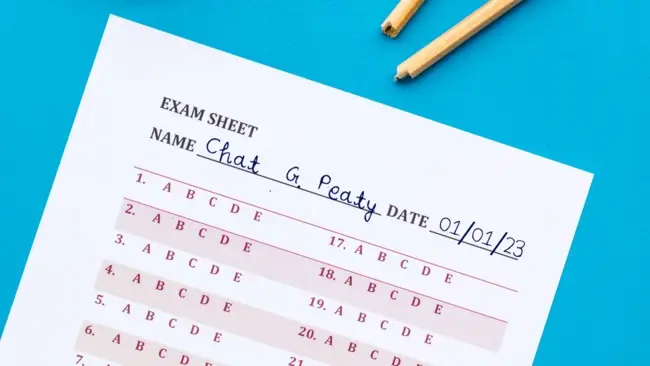A new report by Pennsylvania’s Wharton School has revealed that OpenAI’s ChatGPT is perfectly capable of passing the final exam for the school’s MBA program.
The study, entitled “Would ChatGPT3 Get a Wharton MBA?," said that the generative AI bot scored between a B- and a B when tasked with completing its Operations Management Course final exam, easily cracking many of the most challenging questions on the paper.
Professor Christian Terweisch, who co-authored the research paper, said the bot’s grade demonstrated its remarkable ability to automate some of the skills of highly compensated knowledge workers,” such as analysts, managers and consultants.

The chatbot did an “amazing job at basic operations management and process analysis questions including those that are based on case studies” he explained, with “excellent” explanations for every one of the problems it solved.
The researcher also found that ChatGPT3 was “remarkably good at modifying its answers in response to human hints,” suggesting that the bot may have scored even higher on the exam with human intervention.
But alone, he said it struggled with some basic questions. Terwiesch noted that Chat GPT3 at times made mistakes in relatively simple calculations at the “level of 6th-grade Math.”
It should be noted that the version of the model being used for the research appears to be outdated. The new model – ChatGPT 3.5 – was released in November and boasts even more impressive capabilities than its predecessor.
The new model of ChatGPT has previously succeeded in fooling scientists with accurate human-like research paper summaries, planning a holiday, and even writing articles for tech outlet CNET without being noticed by readers.
“This has important implications for business school education, including the need for exam policies, curriculum design focusing on collaboration between humans and AI, opportunities to simulate real-world decision-making processes, the need to teach creative problem solving, improved teaching productivity, and more,” Terwsich concluded in the report.
A threat to education
The findings arrive in a period of turmoil within education, with teachers, professors and administrators concerned about the implications of AI’s presence within educational institutions.
Just a few days ago, researchers found that ChatGPT could easily pass several parts of the US Medical Licensing Exam, with results that were “comfortably within the passing range,” according to findings posted on preprint server medRxiv.
Experts within the education sector have noted that students could easily use the technology to write essays and cheat on exams – and teachers won’t realise.
“I’m one of the alarmists,” Professor Jerry Davis at the University of Michigan’s Ross Business School told the Financial Times in response to AI's recent emergence in the education space.
“Our whole enterprise in education is being challenged by this, and it’s only going to get more challenging. Time for a top-to-bottom rethink,” he added.
To read more about how AI is affecting the enterprise world, visit our AI in the Enterprise Page.
Many institutions have already begun implementing procedures to prevent the tool from infiltrating classroom procedures, while developers scramble to create AI software capable of detecting ChatGPT-written responses.
“We are having serious discussions and a working group is analysing the implications of ChatGPT and other similar tools that we know our resourceful and inventive students are using, and we will be formulating policies around that soon,” Francisco Veloso, dean of Imperial College Business School in London, explained.
Is it time for AI-enabled education?
While some educators call for new measures to prevent ChatGPT from entering education, many experts see AI as a way to bring innovation to the classroom.
Or, just hear me out:
— dave karpf (parody account) (@davekarpf) January 23, 2023
ChatGPT passed a Wharton MBA exam.
Time to reevaluate your opinion of Wharton MBAs. https://t.co/3QGQeLLYIx
At the end of his study, Dr Terweisch argues that AI tools like ChatGPT could prove invaluable assets for the future of education. He calls for professors to be mindful and open to the potential of AI systems in the classroom.
“An elementary school student still needs to learn that 7 x 7=49 and that the capital of Pennsylvania is Harrisburg, even though calculators have been widely used for over 50 years and students can use Google or Wikipedia to find answers for most factual questions,” he wrote.
Experts ad AI optimists have long called for educational institutions – from elementary to higher – to adopt a new curriculum that utilises rather than vilifies advances in technological innovation.
“AI is NOT replacing doctors, lawyers, or business professionals. “It’s a tool that could make each better if used properly. Dr Jonathan Snow, Founder & COO of The Snow Agency explained in a tweet.
“Don’t fear technology. Learn to use it,” he added.
The education system in many parts of the world is centred around grades and qualifications, but experts believe with the advancement of technology, the grading system needs to be replaced with a system that emphasises growth rather than results.
ChatGPT passed the U.S. medical licensing exam and a Wharton MBA exam.
— Canadian Millionaire Financial Coach 🇨🇦🇺🇸 (@JimChuong) January 23, 2023
The value of post-secondary education has been on the decline.
Do not go into debt for college.
Only go if someone else is paying, and you love the area of study.
Otherwise it is not worth it. pic.twitter.com/vVF8Ili1Gj
“It's time to reform education systems so that students value learning more than the system values grades and curiosity, critical thinking and problem-solving more than recall and memorisation, Prof. Dr Naseem Naqvi MBE explained in a LinkedIn post.
The World AI Cannes Festival brings together the industry leaders and AI change-makers truly committed to change the tech game and create a more purposeful AI world! For its 2nd edition, more than 15 000 of the world’s best AI providers, industry leaders, and visionary startups have already confirmed their participation. This unprecedented concentration of the most successful personalities and architects in AI makes The World AI Cannes Festival the #1 marketplace where you need to be (seen).




Comments ( 0 )